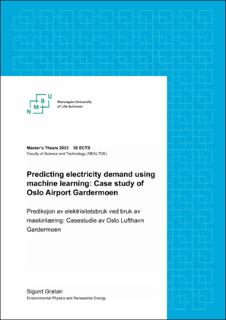| dc.description.abstract | With an increasing need for electricity in society and a more complex energy production mix, future electrical power systems require intelligent systems for efficient resource management. In order to realize the potential of
flexible resources in the power grid, robust and accurate prediction methods
are required. This thesis presents a case study of Oslo Airport Gardermoen
(OSL) to explore the potential of Long Short-Term Memory (LSTM) machine
learning models in predicting electricity demand, particularly focusing on
peak demand forecasting. The models are trained on data from 2022 and
2023, utilizing electricity consumption measurements and exogenous factors
including passenger numbers, outdoor temperature, and electricity prices.
The models demonstrate high accuracy in demand prediction, particularly
for peak hours.
To improve peak prediction capabilities, the thesis implements two main
strategies. First, models are trained using four different loss functions: Mean
Squared Error (MSE), Mean Absolute Percentage Error (MAPE), Negative
Log Likelihood (NLL), and a new proposed Weighted Mean Squared Error (WMSE). Second, a comprehensive grid search and cross-validation routine is performed to robustly determine the optimal model architectures.
The best-performing models are characterized by simple model architectures
with just 1 hidden layer and 64 or 128 units, suggesting that less complex
models can efficiently capture the patterns of the data. These models achieve
adequate MAPE scores, with the lowest being 4.53%.
The new proposed WMSE loss function emphasizes peak hours and significantly enhances peak prediction reliability. Additionally, NLL enables probabilistic outputs, offering valuable uncertainty estimations for practical applications. This thesis provides a robust and versatile framework adaptable
to various energy systems, enabling the development of optimized LSTM
models for efficient electricity demand forecasting.
The implications of this work extend beyond OSL, offering insights for managing flexible resources for efficient and sustainable power system operation. The thesis highlights the promising potential in using advanced machine learning methods for energy management systems, and demonstrates
their ability in large-scale commercial buildings. | |
